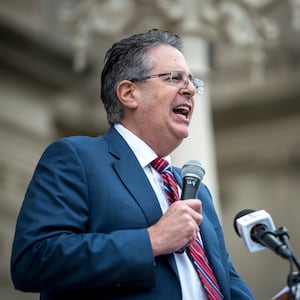As former Trump official John Gibbs moved into the home stretch of his challenge to Rep. Peter Meijer (R-MI) last week, he stopped at a candidate forum in the town of Holland to address the Ottawa County Republicans.
After a slideshow presentation from an anti-vaccine activist about, among other things, the disproven links between vaccines and autism, Gibbs came to the stage and added some misinformation of his own.
“More people are awake than ever before, more people are getting involved than ever before, more people are signing up to be poll challengers, poll watchers, etc… and I think that is a very good thing,” Gibbs said. “And I think what I want to do, two weeks from now, is to win with a big enough margin that we beat the cheating.”
“The cheating” refers to the assumption—now an article of faith in the GOP base after 2020—that all elections are rigged against Republicans.
Such rhetoric fits perfectly with Gibbs’ campaign. Endorsed by the former president, he is challenging Meijer almost entirely because the first-term congressman was one of 10 House Republican lawmakers to vote to impeach Trump after Jan. 6.
But the race in Michigan’s 3rd District is hardly the only one in the Great Lake State that has been dominated by the GOP’s obsession with litigating and re-litigating—and re-litigating again—Trump’s loss in 2020.
When the votes are counted in next Tuesday’s primary election, it’s likely that Michigan Republicans will have nominated a slate of candidates who may be unrivaled anywhere else in their commitment to the Big Lie.
It’s not only that the leading GOP candidates for governor, attorney general, and secretary of state have supported and amplified election conspiracies. Several of them became stars in the party precisely because of their starring roles in the crusade to delegitimize and overturn the 2020 election.
Ryan Kelley, who has consistently polled near the top of the crowded governor primary, rioted at the Capitol on Jan. 6, got arrested, and was later indicted for his actions that day.
The presumptive gubernatorial frontrunner—former Real America’s Voice anchor Tudor Dixon—is billed as more moderate: She simply defended and downplayed the insurrection instead of attending it.
Matt DePerno, already minted as the nominee for attorney general, was at the heart of a bizarre effort to audit the vote in a rural Michigan county that led to the leaking of reams of voting data.
And Kristina Karamo, also already nominated by Michigan Republicans as secretary of state, is a political newcomer who rocketed to fame in MAGA circles after claiming she witnessed widespread fraud in Detroit after serving as a poll place volunteer in 2020.
The 2022 GOP ticket in Michigan would represent a radical departure for the state party that once produced the Romney dynasty and, more recently, some of the lone anti-Trump Republicans in Congress.
“Obviously the Trumpian side of the party has grown to be very significant and there are a large percent of the voters that believe the election was not held fairly, not held correctly and they may have been stolen,” said Saul Anuzis, a former Michigan Republican chairman.
“That has obviously given life to some other candidates who kinda played the ‘I’m pro-Trump, I’m a pro-Trump guy who agrees that he was cheated and the election was stolen’ and that’s giving them a fairly large base of support,” he said.
But, Anuzis cautioned that, though it’s useful in the primary, “I don’t think you can win on that issue alone.”
The incumbent Democrats—Gov. Gretchen Whitmer, Attorney General Dana Nessel, and Secretary of State Jocelyn Benson—have all led their prospective challengers in initial polling.
But 2022 is shaping up to be a difficult year for Democrats in battlegrounds like Michigan. Democrats warn that fringe candidates could ride a red wave into office come November—and take control of the state’s elections in 2024.
“On the ground, it’s terrifying,” said Mallory McMorrow, a Democratic state senator in Michigan, of the Republicans’ prospective ticket of election deniers. “In Michigan, the hyperbolic is reality, almost.”
But Gibbs’ campaign may have special resonance in how Republicans, from Trump to in-state GOP insiders, have mobilized not only to elevate an election denier but also to fire Meijer, one of the few Republicans who have stood up to Trump’s conspiracies.
Gibbs has made former President Trump’s endorsement the centerpiece of his campaign and “election integrity” including the disproven claim that the 2020 election was stolen, a key pillar.
Days after Gibbs spoke at the Ottawa GOP forum, he was asked by a local news channel whether he’d accept the outcome of his primary race on Aug. 2. After noting the growing number of poll watchers, Gibbs said “that remains to be seen.”
In an interview that aired July 27 on CNN, Gibbs compared the lack of evidence of widespread election fraud to crimes the Mafia committed but were not immediately arrested for.
“For many years, you could never arrest them, you knew they were throwing guys off roofs and stuff,” Gibbs said. “But I think we will get there just like we did with the Mafia.”
In an email to The Daily Beast, AnneMarie Schieber, a spokeswoman for Gibbs campaign, said questioning the validity of the election was an issue that appealed to a broad swath of Americans.
“The best place to resolve skepticism about election integrity is through state legislatures, not the courts, not bureaucrats,” Schieber wrote. “Every voter should have 100 percent confidence in the election system and the U.S. should be leading international standards, not falling below them. Any elected official who states the 2020 election is ‘settled’ should be on board in confirming that."
Gibbs’ rhetoric has been so inflammatory, it attracted the attention of national Democrats at the Democratic Congressional Campaign Committee, who dropped more than $400,000 into an ad in the race calling him “too conservative” for Michigan.
The hope was that a DCCC ad calling him too conservative would bolster his candidacy in the primary and thus help Democrats eventually win the seat in the general election. (The move was swiftly rebuked by fellow House Democrats as a waste of money and a dangerous gambit.)
Days later, the Democratic Governors’ Association raised eyebrows by dropping a staggering $2 million in attack ads against Tudor Dixon, the GOP gubernatorial frontrunner, in the home stretch of the primary.
The ad, which attacked Dixon over her position on funding for law enforcement, hits the candidate on a key GOP concern just as primary voters make their decisions. But it differs from the Gibbs ads—a clear ploy to meddle in a GOP primary—in that it dings Dixon on a central issue that could resonate to voters in the general election.
Recent polling has shown Whitmer leading any of her potential GOP challengers by comfortable margins. Ironically, a July poll found the strongest candidate against the incumbent is Ryan Kelley, who is currently enmeshed in legal proceedings around his actions at the Capitol on Jan. 6.
In early July, Kelley pleaded not guilty to four misdemeanor charges stemming from his actions at the Capitol, which include disorderly conduct and willfully injuring federal government property. He has used his status as a Jan. 6 defendant to boost his appeal to GOP primary voters.
Re-litigating the 2020 election is central to Kelley’s platform. His website says that on “day one” of his term as governor, he would cancel contracts with voting machine maker Dominion—a top focus of conspiracies—to “lay the foundation for eliminating fraud and restoring election integrity.”
In a reply to questions about how the stolen election message might play in November and if he had received pushback on the campaign trail, Kelley replied by attacking Whitmer’s handling of the COVID pandemic in nursing homes, the impact of lockdowns on small businesses, and her alleged “rules for thee but not for me” approach to leadership.
DePerno, the attorney general hopeful, has led a quixotic campaign to audit the votes of rural Antrim County in Michigan, where election officials accidentally reported Joe Biden winning the county before correcting the error.
The crusade has made DePerno a star of the MAGA wing. But courts have routinely found no basis to his demands for an “independent audit” of the votes in the 23,000-person county. An investigation led by Michigan state senators called for probes into “those who have been utilizing misleading and false information about Antrim County to raise money or publicity for their own ends.”
DePerno’s campaign did not respond to a request for comment.
Karamo, the secretary of state candidate, was a fairly unknown quantity in Michigan politics before becoming a poll worker in Detroit in 2020. She pushed claims that shady ballot counting happened in the middle of the night after Election Day—claims that were quickly debunked but made her a fixture on the national Stop-the-Steal rally circuit.
In 2021, Karamo appeared at a QAnon-adjacent conspiracy conference in Arizona; previously, on her podcast, she had expressed a belief that “demonic possession is real” and that it can be spread through “intimate relationships.”
When Trump endorsed Karamo, he did so with a typically unsubtle expression of his expectations for her. “Good luck Kristina, and while you're at it, check out the Fake Election results that took place in the city of Detroit,” the ex-president said.
Karamo’s campaign did not return a request for comment made on the campaign website.
Meanwhile, Democrats are grappling with how best to craft a message that highlights the fringe views of these Michigan GOP candidates while avoiding overstatement and ambiguity.
“We can’t just say things like, ‘if Ryan Kelley and Matt DePerno get elected, then it’s the end of our democracy,’” said McMorrow, the state senator who found viral fame recently for a speech she gave on countering GOP culture war issues. “That doesn't actually mean anything to the average person.”
McMorrow continued that Democrats need to connect these candidates’ views to specific things, like the Supreme Court’s likely consideration of a case that could give elected state leaders unprecedented control over their presidential elections.
Abdul El-Sayed, a progressive activist and candidate for governor in 2018, said Democrats can’t take it for granted that voters will find the GOP candidates self-disqualifying.
“I worry it’s lazy to assume that the Republicans are self-indicting,” El-Sayed said, “that if you just point to what they are—which is a stinking diaper in a dumpster fire—that’s enough.”













